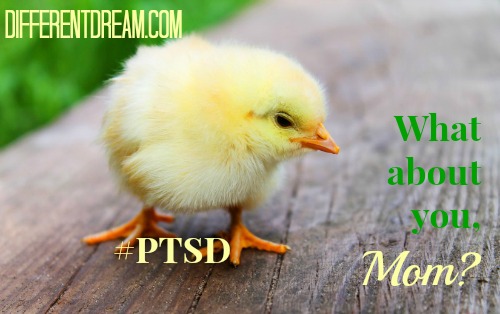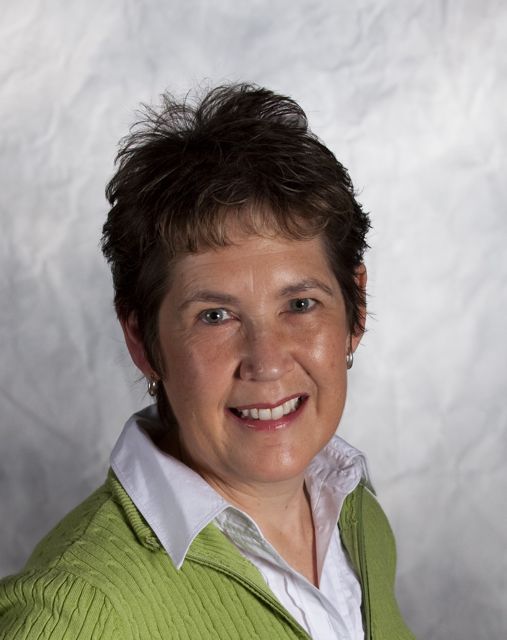Editor’s note: This is a guest post by Jolene Philo, for a summer series highlighting great writers who focus on disability.
PTSD and parents. I don’t want those two words to go together in the same sentence. Ever. But the truth is that PTSD and parents (especially the special needs variety) spend way too much time in one another’s company. That’s why Different Dream launched its series about special needs parents and PTSD with a review of its recent parent survey results. I am intimately familiar with this topic as I recently came to grips with the trauma surrounding the birth of my first child in 1982.
What About You, Mom?
A few hours after our first child’s birth in 1982, he was life-flighted to a hospital 750 miles away for life-saving emergency surgery. For the next 4 years, my mother hen instincts were absorbed in caring for my little chick. Life felt like a revolving door as my husband and I watched him go in and out of the doctor’s office, in and out of the hospital, in and out of surgery way. That revolving door left very little time for self-examination or working through the trauma I had experienced after his birth.
So I shut the door to my emotions and kept them safely under lock and key for years–even decades–after our son’s health stabilized. Those emotions remained stuffed away until 2008 when our son, then 26, was treated for PTSD caused by all the early, invasive medical trauma he had experienced.
I was sitting in the trauma clinic’s waiting room minding my own business when one of the therapists stopped by to visit about our son’s progress. After confirming that our boy was progressing well, the therapist looked me in the eye and asked, “What about you, Mom?”
I had no idea why he was asking the question. “I’m fine,” I replied, puzzled.
He raised a quizzical eyebrow. “Is that so?”
For several years I ignored his question whenever it niggled in my brain. But then last fall, something happened to someone I love dearly, and that event unlocked the door to my emotions. Long hidden emotions came tumbling out. Once again I felt as alone and weak and helpless as the day the doctor took my newborn baby away. I felt stuck in the past, unable to move beyond the constant sense of worry and loss surrounding me.
I described my feelings to my sister, a mental health counselor. “You went through a lot when your baby was born,” she confirmed. “And you never processed your emotions. I think some Eye Movement Desensitizing and Reprocessing (EMDR) therapy might help you.” She did some online research and sent contact information for several therapists in our area and advice about dealing with our insurance. A few weeks later, I scheduled my first of several weekly appointments with a compassionate and skilled therapist. A few months later, she said we were done.
By then we’d become friends. I was sad to say good-bye to her, but I knew she was right. I no longer felt stuck. I could think about the early days and years of our son’s life and maintain an emotional distance that kept me from getting sucked back into them. Leaving her office for the last time, I resolved to share my experience with other parents of kids with special needs so they can find help and process their emotions soon after soon after they are traumatized.
If you think special needs parents and PTDS are living side by side in your life, I urge you to seek treatment. Follow these steps to find a therapist:
- Ask your insurance company for a list of mental health therapists in their network.
- Identify therapists on the list who have specialized trauma training.
- Check them out on the internet.
- Call their offices and ask them about their trauma training and therapy techniques.
- Make an appointment with a therapist that best matches your needs.
- Go to a few appointments. If you see red flags or don’t feel comfortable find a different therapist. But if you see progress, keep going until you’ve worked through your emotions.
So What About You, Mom?
That’s my story, and that’s my advice. But before signing off, let me ask you a few simple questions:
What about you, Mom?
What about you, Dad?
What about you?
What about you?
Want to know more about the PTSD series?
Part 2: Special Needs Parents and PTSD–What About You Mom?
Part 5: PTSD in Parents–Moving from Negative to Positive
Jolene Philo is the author of the Different Dream series, The Caregiver’s Notebook, Every Child Welcome and a new book, Does My Child Have PTSD? which will be released in October of 2015.. She speaks frequently at special needs and foster care conferences around the country and conducts special needs ministry training workshops for churches. Jolene and her husband Hiram live in Boone. They are parents of two married children and grandparents to three beautiful grandchildren. She blogs at DifferentDream.com and JolenePhilo.com.





You are describing my life precisely in this post. I hid my emotions deep in my inner soul for years feeling I didn’t have any time to feel sorry for myself. I was way too busy caring for a child who was totally dependent on me. I advocated for him for 28 years.
Fast forward to 2013, my son passed away, my other son is married, I was retired with too much free time. I slowly realized several pertinent changes in my personality. I started speaking out for my rights as a woman for the way my husband was treating me.
We sought therapy and this is when the flood gates opened. I allowed my husband to emotionally abuse me and I let him get away with it because I was too busy caring for the needs of my son on my own.
Presently I am being treated for an anxiety disorder caused by the PTSD, I no longer allow anyone to treat me disrespectfully again and I wrote my book telling the whole story advocating for my son for 28 years.
I am a new woman today after opening the doors of my soul and letting the demons out.
Wonderful that you have learned to speak up for yourself. I am mom and full time caregiver to my son who is 8. He has down syndrome,autism, oppositional defiance disorder and is very sensitive to heat and sun light. I am also caregiver to myhusband who has stage 3 brain cancer and prostate cancer. I also have PTSD,anxiety,bipolar disorder and OCD so i totally understand where you took the mess from others because you were so focused on caring for your son. Although my husband is a kind soul, he at times can be very petty and often tries to make me feel like I am an idiot. Even told me once I was a bad mom because I refuse to treat my son like he is disabled….I allow and expect him to do the things I know he can do if he wants to. I myself had a hard life which is why I have all those issues to start with( I was beaten,raped and left for dead by an as of now unknown assailant at the age of 27 and also molested by some boys from my neighborhood when I was 6). I carried both these secrets until I was 34 when I had a point of either getting help or commiting suicide. The lord is the reason I am still here…without his grace and love I would have definitely spiralled into my grave….I tell you this because one its healing for me to share even a small bit of my story, and 2, because I want you to know that we are strong as women in general bit moms of special needs children are even stronger,out off love and necessity…. I wouldn’t change my life as a special needs mom for anything. ….may god bless you and hold you in the highest regard…….Lisa